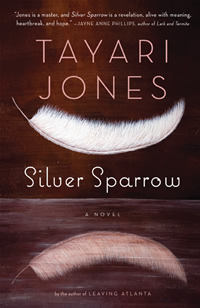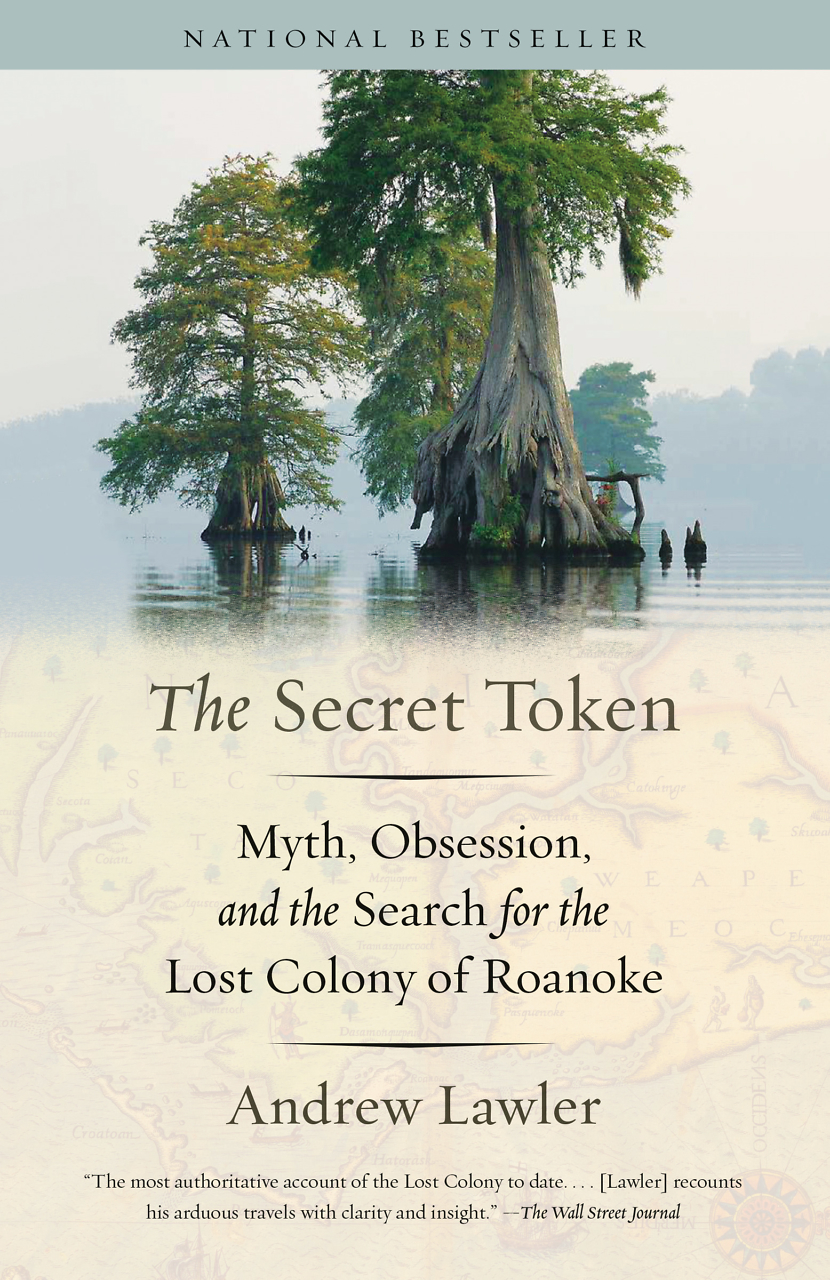Hidden Costs
In Silver Sparrow, Tayari Jones explores the burden of secrecy
In Silver Sparrow, the third novel from Tayari Jones, a girl named Dana Lynn Yarboro grows up a captive to her parents’ secrets. Her father, James Witherspoon, who is married to her mother, Gwendolyn, has another wife. With Laverne Witherspoon—his first wife—he has another daughter, Chaurisse. The Witherspoons live in the same south Atlanta community as Gwendolyn and Dana, and from an early age, Dana learns what it means to be an “outside child,” forbidden to tell anyone of her real father. But over time her desire to know Chaurisse, and her desire to be known, gets the best of her, and Dana begins to pick away at the thin membrane of secrecy that keeps them apart.
Set in the 1980s with deft, understated detail, Silver Sparrow is a thoughtful story about bigamy, but it is also a lovely, realistic portrait of two teenage African-American girls, and an exploration of the bonds between mothers and daughters. Sisters Dana and Chaurisse provide the voices of the book, forming its two halves, with Dana’s narration followed by Chaurisse’s, and a very brief final word from Dana. Both Dana and Chaurisse operate on two levels: as deeply sympathetic characters in compelling circumstances, and as narrators possessed of maturity and vision, telling detailed stories of their mothers’ lives before they were born.
But while the book’s emotional depths are found in Jones’s portrayal of the lives of girls and women—of mothers and daughters—James Witherspoon is something of a wonder, too; so fully human, flawed and complex, that he cannot possibly be dismissed as a villain. He is plain-looking (“a bit on the short side and [with] glasses thick as a slice of Wonder bread”), hard-working, and afflicted with a bad stammer most likely to flare when he is agitated or angry. He is no ladies’ man. He’s simply a man who fell in love with two women and is trying, in his flawed way, to straddle the worlds of two families. He has some support in this effort—his best friend and business partner, Raleigh, another terrifically unique character, is the only other person privy to James’s secret, and a caring uncle to both girls. (On Dana’s birth certificate, he is listed as her father.) Still, the job is an impossibility: Dana and her mother, who must remain hidden, are clearly disadvantaged in the equation. And in several heartbreaking scenes, Jones demonstrates just how painful this silence can be for them.
 The girls have the same peers; they each want to participate in the same weekend enrichment programs, to apply for summer jobs at Six Flags. In each case, Dana is denied, forced to defer to Chaurisse, lest the two meet. Dana’s resentment of her father’s “legitimate” family grows, and her pain manifests in other areas of her life. She dates a boy who sees her only on the side, who gives his class ring to another girl. “I slipped easily into my role as unacknowledged girlfriend,” she says. “When you already had one secret life, what bother was it to have another secret within that secret?”
The girls have the same peers; they each want to participate in the same weekend enrichment programs, to apply for summer jobs at Six Flags. In each case, Dana is denied, forced to defer to Chaurisse, lest the two meet. Dana’s resentment of her father’s “legitimate” family grows, and her pain manifests in other areas of her life. She dates a boy who sees her only on the side, who gives his class ring to another girl. “I slipped easily into my role as unacknowledged girlfriend,” she says. “When you already had one secret life, what bother was it to have another secret within that secret?”
Yet Dana keenly surmises that her situation offers its own source of power. “Life, you see, is all about knowing things,” she reflects. “That is why my mother and I shouldn’t be pitied. Yes, we have suffered, but we never doubted that we enjoyed at least one peculiar advantage when it came to what really mattered: I knew about Chaurisse; she didn’t know about me. My mother knew about Laverne, but Laverne was under the impression that hers was an ordinary life. We never lost track of that basic and fundamental fact.”
In the book’s second half, narrated by Chaurisse, Jones explores themes of outsiderness, appearances, and privilege from a different angle. Unlike Dana, who has inherited her mother’s good looks, Chaurisse is a plain girl. But the beauty industry is her mother’s bread and butter: Laverne operates a hair salon, The Pink Fox, out of their home, and Chaurisse often pitches in with the wash-and-sets. She observes the comfort, strength, and satisfaction that beauty provides, noting, “There are two kinds of pretty, my mama always said. Natural Beauty, which is what your mama gave you. Everybody can’t be that lucky, so for us, there is Pretty in a Jar.” Chaurisse too lives on a periphery—on the outside looking into the world of what she calls silver girls: “girls who were natural beauties but who also smoothed on a layer of pretty from a jar.” She is oblivious, of course, to the privilege her role as a legitimate daughter provides. “I had never had much luck with the silver population,” she reflects. “For the most part, silver girls were polite, especially if their parents knew mine, and especially if my mama did their hair, but none of them ever took me in, told me their secrets.”
 In a terrific pivotal scene, Chaurisse encounters one such silver girl at a drugstore when both are nearly caught shoplifting makeup. Little does she know that this beautiful girl with long, lustrous hair is her sister Dana. A fast friendship begins, adding another layer of secrecy: Chaurisse does not know Dana’s true identity, and Gwendolyn is unaware of Dana’s exploration into the life of her secret sister. Chaurisse envies Dana’s prettiness, but she is drawn to this girl who, though lucky in looks, seems as lonely, as needful of a friend, as she.
In a terrific pivotal scene, Chaurisse encounters one such silver girl at a drugstore when both are nearly caught shoplifting makeup. Little does she know that this beautiful girl with long, lustrous hair is her sister Dana. A fast friendship begins, adding another layer of secrecy: Chaurisse does not know Dana’s true identity, and Gwendolyn is unaware of Dana’s exploration into the life of her secret sister. Chaurisse envies Dana’s prettiness, but she is drawn to this girl who, though lucky in looks, seems as lonely, as needful of a friend, as she.
But Silver Sparrow is not a story of sisterly love so much as it is one of the fraught love between mothers and daughters. Chaurisse is a pillar for her mother, not to mention her right-hand-gal in the salon; and for a time, living in secrecy tightens the bond between Dana and her mother. “Let’s go surveilling,” she says to Dana one morning after they’ve fought, “surveilling” being Gwen’s term for spying on Laverne and Chaurisse. But the burden of secrecy ultimately strains their relationship. Dana, Gwen reminds her, is all she has, and vice versa; and yet Dana can’t help but resent her mother for her “desperate love for me, her weighty kisses.”
Years later, when she has a young daughter of her own, Dana hugs the little girl tight, reflecting, “I used to swear that I would never be a desperate mother, that I would always respect the line between Flora and me. But I squeezed her hard and asked more than once, ‘Do you love your mommy? Do you love me, baby?’” It’s one of many poignant moments in this graceful, intelligent, and often sad novel, which ponders the dangers of love, and the fallout of family secrets.
Tayari Jones will appear at the 2011 Southern Festival of Books, held October 14-16 in Nashville.


